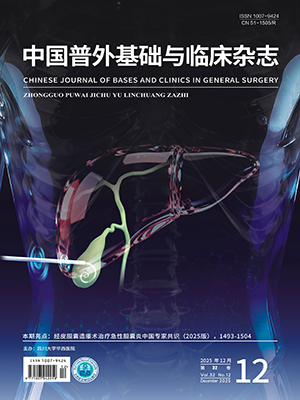Objective To explore the effectiveness of neoadjuvant chemotherapy on postoperative risk of colorectal cancer by use of estimation of physiologic ability and surgical stress (E-PASS).
Methods A total of 161 patients with colorectal cancer according to the inclusion criteria from January 2009 to December 2009 in West China Hospital of Sichuan University were analyzed retrospectively,who were assigned to neoadjuvant chemotherapy group (NC group, 78 patients) and non-NC group (83 patients). The postoperative risk of each group was assessed by the E-PASS scale including preoperative risk score (PRS),surgical stress score (SSS),and comprehensive risk score (CRS).
Results The baseline of two groups had no significant difference (P>0.05). The postoperative complication incidence of two groups had no significant difference either (P>0.05), which was 10.26% (8/78) in the NC group,and 7.23% (6/83) in the non-NC group. The PRS was 78.42 in the NC group and 83.42 in the non-NC group (P=0.497). The SSS was 80.77 in the NC group and 81.22 in the non-NC group (P=0.951). The CRS was 80.74 in the NC group and 81.24 in the non-NC group (P=0.976). The accuracy of the postoperative risk assessment was 70 cases and 78 cases in the NC group and non-NC group,respectively. There was no significant difference of accuracy between two groups (P=0.325).
Conclusions Neoadjuvant chemotherapy does not increase the risk of patients with colorectal cancer after operation,and the results suggest that E-PASS scale can provide a more accurate assessment of neoadjuvant chemotherapy in patients with surgical risk.
Citation: SHAO Na,TANG Zhiyun,HUANG Libing,WU Ting,WANG Xiaodong,LI Li,.. Estimation of Physiologic Ability and Surgical Stress for Neoadjuvant Chemotherapy on Postoperative Risk of Colorectal Cancer. CHINESE JOURNAL OF BASES AND CLINICS IN GENERAL SURGERY, 2012, 19(5): 517-521. doi: Copy
Copyright ? the editorial department of CHINESE JOURNAL OF BASES AND CLINICS IN GENERAL SURGERY of West China Medical Publisher. All rights reserved




